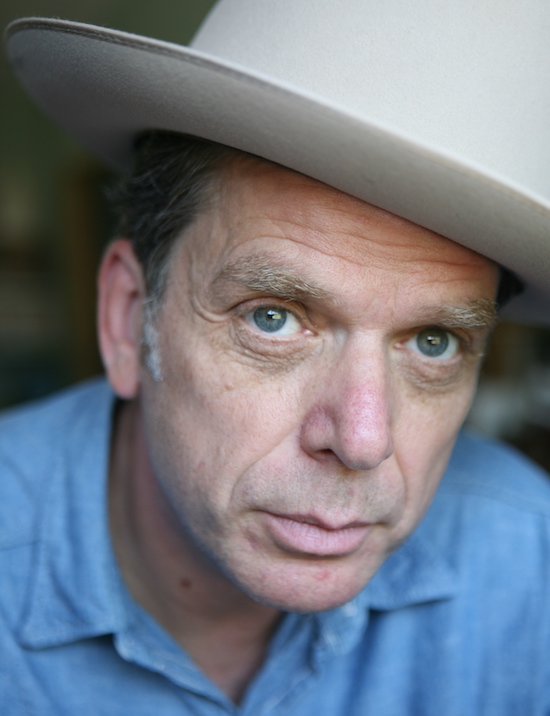Jeb Loy Nichols’ ‘Countrymusicdisco45’ was inspired when he heard a DJ mix a Charlie Rich track into a full on disco set. But it could easily have been about his own musical gumbo. Raised on both bluegrass and punk during his teenage years in Missouri, he moved to New York in the late 70s. There he immersed himself in early hip hop and the deeper end of disco while at art school, witnessing a Bambaata block party in the South Bronx and dancing to Larry Levan at Paradise Garage.
"At the time there weren’t that many clubs in New York not worth going to," says Jeb. "So I spent a lot of time in certain downtown spots like Tier Three, The Loft and of course Paradise Garage." It was at the Mudd Club that he met and became friends with Ari Up from the Slits and Neneh Cherry, with whom he shared a squat when he moved to London in 1983. Also in the house was Adrian Sherwood. "Adrian taught me everything I needed to know about the music business. He had three rules: don’t be a bastard, make music that means something, and don’t worry about what anyone says," says Jeb. "He also played me music that matters. Joe Higgs, Israel Vibration, Culture, Prince Far I."
Under the name Jeb Loy & The Oil Wells he recorded the abstract country dub funk track ‘Things That Make U.S.’ on the On U Sound compilation ‘Wild Paarty Sounds Volume 1’ for the Cherry Red label. Country and reggae have a long time if unlikely alliance, a fact Jeb was all too aware of when he formed a country dub band Fellow Travellers with On-U Sound man Martin Harrison. In the mid 1990s his mixed his love of reggae and his penchant for lino cut art as in house designer for Pete Holdsworth’s Pressure Sounds label.
In 2010 he finally released an LP on On-U Sound. Entitled Long Time Traveller, it set the country soul vocals of Jeb against the riddims of Dub Syndicate and Roots Radics. He has to date released 10 LPs of genre crossing music mixing soul, country, and reggae. At the same time he helped open many ears to white southern soul singers like Larry Jon Wilson and Travis Wammack when he compiled two ‘Country Got Soul’ LPs for current manager Ross Allen’s Casual label. "I was living in London at the time and writing songs with a drum and bass group called Underwolves," recalls Jeb. "One Sunday afternoon we met at my house with Ross who had signed them to Island. I began playing some of my favourite tracks from Travis Wammack, George Soule and Eddie Hinton, and Ross was instantly intrigued. It was a corner of soul into which he’d never ventured. I made him a cassette tape and we spent the next few months talking about Nashville, Memphis, New Orleans and Muscle Shoals."
Jeb has also published a book of his artwork, a novel and a paperback of poetry about his friendship with one of the outstanding voices from Country Got Soul. "Larry Jon Wilson was one of the great Southern singers that never broke through to the mainstream," says Jeb. "Too funky for country audiences, too country for the soul crowds, too eclectic for pop radio, he fell between the cracks."
Currently living deep in the Welsh hills he continues to "write, produce art, make music, and plant trees". The latest results are to be released on his new LP The Country Hustle. And despite not having a record shop within miles of his current home he has never lost his vinyl habit: "Working in record shops told me who I was. Told me who I wanted to be. I never made any money but I amassed a lot of records. Which I sold. Then amassed again. Then bought again. And on it goes. I can’t walk past a record shop. No matter where, no matter the time of day I have to go in and have a peek. They’re my natural habitat, my college, my neighbourhood. They’re familiar, threatened, peripheral, nearly extinct, full of arcane and necessary stuff… Just like me."
When asked to come up with his favourite records he told The Quietus: "Music, for me, has always been a mountain railroad; erratic, often lonely, beautiful, unexpected, moving to its own strange time table. Many are the hours I’ve waited for a train; many are the trips I’ve taken. These 13 records are some of the stops along the way."
Jeb Loy Nichols’ Country Hustle is out now, he appears at The Social in London on 19th April, for more information visit the venue website. Click the image of Jeb below to begin reading about his selections


